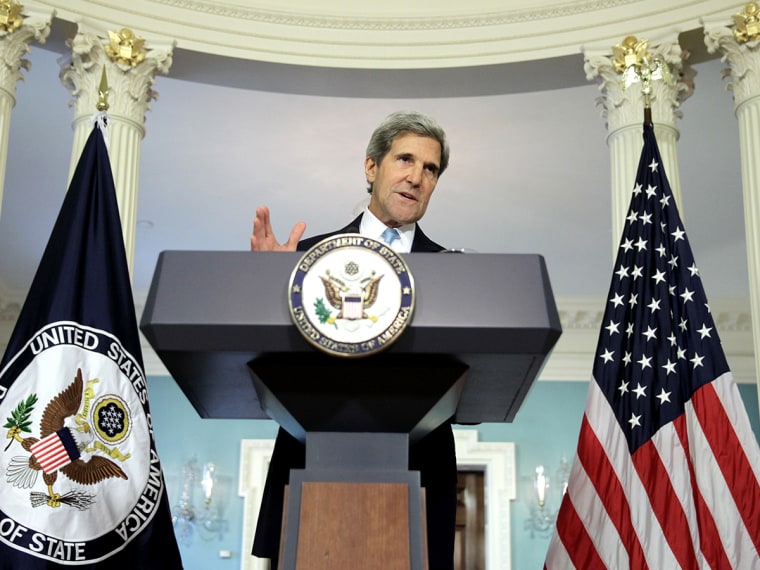If John Kerry's rhetorically aggressive speech on Syria sounded familiar, perhaps it's because another secretary of state made similar remarks a decade ago in laying out the case for a U.S. military operation in the Middle East.
On Feb. 5, 2003, Colin Powell--with diagrams, electronic intercepts and satellite photographs in tow—spent two hours telling members of the United Nations Security Council that Iraq was aiding terrorists and concealing weapons of mass destruction.
President George W. Bush’s foreign policy chief said the evidence was “irrefutable and undeniable.” He added, “Clearly Saddam will stop at nothing until something stops him,” and, “with all the information the United States now has, leaving Saddam Hussein with weapons of mass destruction for months or years is not an option--not in a post-Sept. 11 world.”
Powell displayed satellite photos that he said showed “active chemical munitions bunkers” and pictures of facilities that had, he said, been “sanitized” before U.N. inspectors arrived. He showed what he said was an intercept of Iraqi military officers discussing how to hide evidence of banned weapons programs. Not too long after Powell's speech--on March 20--the U.S. attacked Baghdad with missiles and bombs. U.K and U.S troops moved into Iraq and military operations officially began.
Of course, the retired four-star general’s claims have been proved bogus. Powell has since called that infamous speech a “blot” on his record, adding that it was “devastating” to eventually learn the information he was handed was unreliable.
Fast forward to today: Kerry said the U.S. knows with “high confidence” that a chemical weapons attack was carried out by Syrian President Bashar al-Assad against his own people. He said 1,429 people, including 426 children, were killed in the attack earlier this month.
He didn’t have photos and diagrams like Powell, and his speech didn’t last anywhere near as long, either. Kerry released an unclassified intelligence report on the use of chemical weapons in Syria, which said the Assad regime carried out the chemical attack just outside on Damascus, citing sources and communication intercepts. He also pointed to horrific images and video that have surfaced online this week.
Like Powell, Kerry said that inaction would have serious consequences.
“It matters to our security and the security of our allies. It matters to Israel. It matters to our close friends Jordan, Turkey and Lebanon, all of whom live just a stiff breeze away from Damascus. It matters to all of them where the Syrian chemical weapons are--and if unchecked they can cause even greater death and destruction to those friends,” he said.
Kerry, aware of the public's hesitation after a decade of war, repeatedly insisted that Syria is not Iraq 2.0.
“Our intelligence community has carefully reviewed and re-reviewed information regarding this attack. And I will tell you it has done so, more than mindful of the Iraq experience. We will not repeat that moment,” he said.
Of course, the cases are different in many ways. There is no question that Syria possesses chemical weapons--the issue, some say, is whether the regime turned them on its own citizens. Another key difference: no one in the Obama administration is suggesting anything close to the massive ground invasion that Bush launched into Iraq. In fact, the White House has said repeatedly that it has no plans to put boots on the ground. But whether Kerry's case for Syria becomes the career-tarnishing blot that Powell's Iraq argument is, history will decide.
